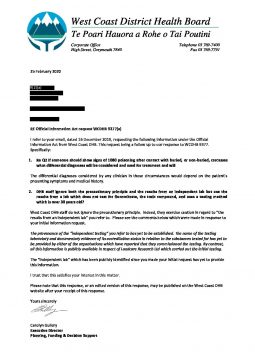RE Official Information Act request WCDHB 9377(a)
I refer to your email, dated 16 December 2019, requesting the following information under the Official Information Act from West Coast DHB. This request being a follow up to our response to WCDHB 9377. Specifically:
1. Re Q2 If someone should show signs of 1080 poisoning after contact with buried, or non-buried, carcasses what differential diagnoses will be considered and used for treatment and will
The differential diagnoses considered by any clinician in those circumstances would depend on the patient’s presenting symptoms and medical history.
2. DHB staff ignore both the precautionary principle and the results from an independent lab but use the results from a lab which does not test for fluorocitrate, the toxic compound, and uses a testing method which is over 30 years old?
West Coast DHB staff do not ignore the precautionary principle. Indeed, they exercise caution in regard to “the results from an independent lab” you refer to. Please see the comments below which were made in response to your initial information request.
The provenance of the “independent testing” you refer to has yet to be established. The name of the testing laboratory and documentary evidence of its accreditation status in relation to the substances tested for has yet to be provided by either of the organisations which have reported that they commissioned the testing. By contrast, all this information is publicly available in respect of Landcare Research Ltd which carried out the initial testing.
The “independent lab” which has been publicly identified since you made your initial request has yet to provide this information.

